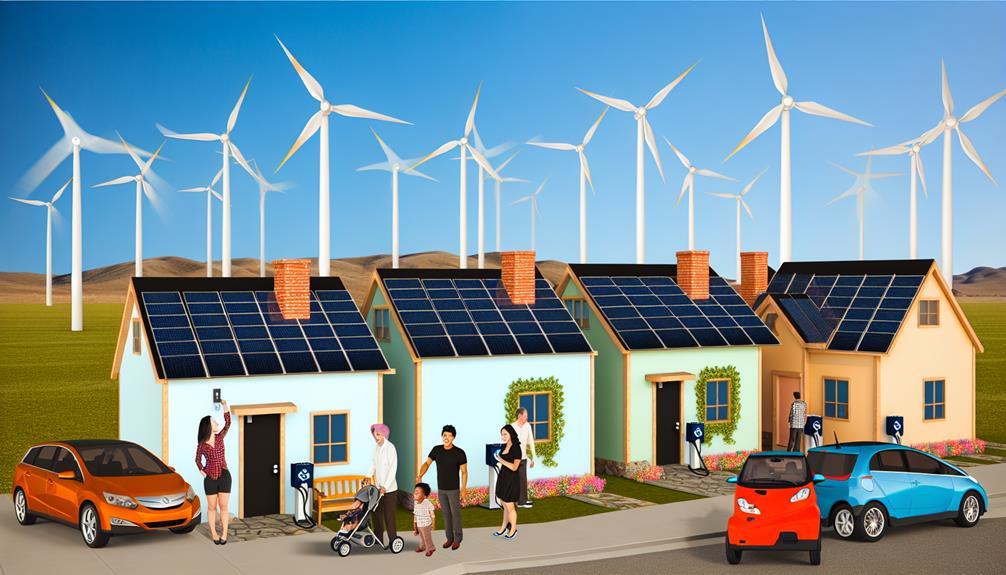You know how crucial it is to create a strong community that can weather any storm. Getting on board with renewable energy projects plays a key role in building this resilience.
So, why are these projects such a big deal? By making the switch to sustainable energy sources, communities can not only cut down on their environmental impact but also…
Importance of Renewable Energy Initiatives
Switching to renewable energy sources is crucial for building stronger communities. Solar and wind power offer reliable, clean, and sustainable energy options, reducing our reliance on fossil fuels. This shift not only helps combat climate change but also enhances energy security. Embracing clean energy technologies allows local areas to generate their power, ensuring they can keep essential services running even in tough times.
Beyond the environmental benefits, clean energy also boosts public health by cutting down on air pollution. Cleaner air means healthier residents and improved well-being overall. Furthermore, investing in clean energy projects creates jobs, boosts the economy, and aligns with long-term sustainability objectives. Prioritizing clean energy solutions helps communities establish a more resilient foundation that benefits both the environment and the people living there.
Benefits of Clean Energy Solutions
Clean energy solutions offer more than just environmental benefits; they drive economic growth, boost public health, and enhance community well-being. These initiatives are crucial for building resilience within our communities.
By cutting down on greenhouse gas emissions, clean energy solutions help communities withstand the impacts of climate change, making them more resilient to extreme weather events and other environmental challenges. Moreover, promoting energy independence and reducing reliance on fossil fuels bolsters the resilience of local energy systems, making them less susceptible to supply disruptions or price fluctuations.
Furthermore, clean energy initiatives create green jobs and spur economic growth, contributing to the overall resilience of communities by fostering sustainable development. By improving public health through decreased air pollution, clean energy solutions not only boost community well-being but also cultivate a healthier and more resilient population that can better confront health challenges.
Additionally, ensuring affordable and sustainable energy access for everyone enhances the overall resilience of communities by guaranteeing that basic energy needs are met, even during crises.
Enhancing Energy Resilience Through Renewables
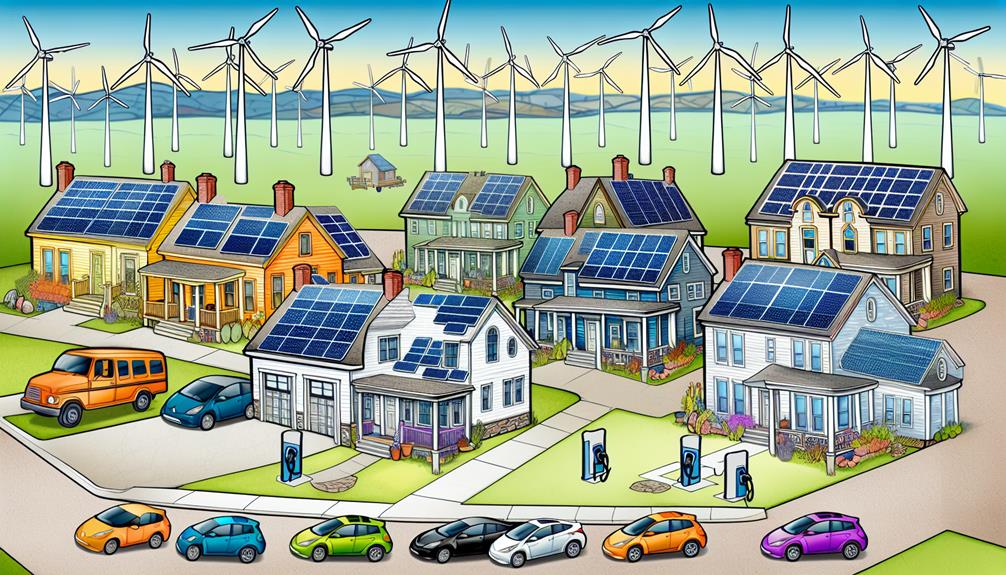
When it comes to boosting community resilience through renewable energy projects, the key is to fortify energy systems with clean and dependable power sources, especially in times of crisis. By setting up solar and storage microgrids fueled by renewable sources, neighborhoods can ensure a continuous energy flow, even when the main grid faces disruptions.
These community-owned renewable energy setups not only offer a more sustainable power option but also empower local residents to manage their energy requirements. By reducing reliance on centralized grids through the integration of renewables, communities can decrease their vulnerability to power failures, becoming more self-sufficient during emergencies.
Moreover, incorporating renewable energy into community energy frameworks enhances overall resistance to climate change impacts and severe weather occurrences. By embracing renewable energy solutions, communities can construct a sturdier and more dependable energy infrastructure that can better withstand and bounce back from various challenges and disturbances.
Empowering Communities With Sustainable Energy
When we empower communities with sustainable energy, we're not just providing them with reliable, clean, and affordable electricity. We're also helping them build resilience and foster local development. By introducing renewable energy projects, communities can boost their energy resilience, ensuring a continuous power supply even during disruptions.
Using sources like solar and wind power reduces their reliance on centralized grids, enhancing energy security within the community. This transition to sustainable energy not only benefits the environment but also creates economic opportunities through job growth and local development. As communities embrace sustainable practices, they become more energy independent, strengthening their resilience against power outages and other energy-related challenges.
Benefits of Empowering Communities with Sustainable Energy:
- Boosts energy resilience
- Decreases dependence on centralized grids
- Stimulates economic growth and job opportunities
- Supports local development
- Enhances community resilience against power outages
Strengthening Community Resilience With Renewables
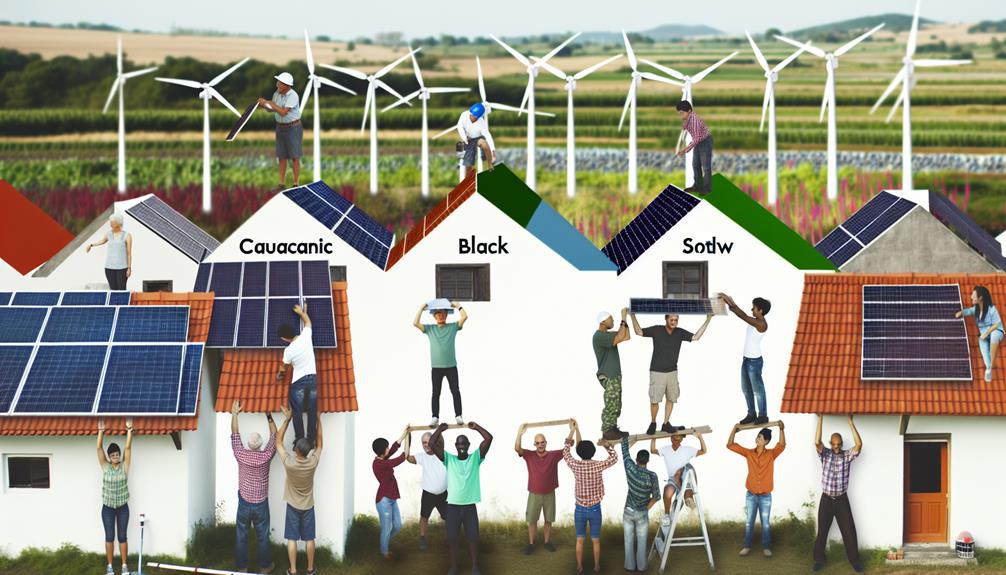
Let's talk about how renewable energy can make a real impact in our communities, especially during tough times like emergencies. When the usual power sources fail, renewable energy steps in to keep things running smoothly. Picture solar panels and storage systems working together to create microgrids that keep crucial facilities up and running when everything else is down.
Getting everyone involved in renewable energy projects not only gives us cleaner and more affordable energy but also makes our communities stronger. When we take charge of our energy sources, we're not just preparing for emergencies – we're also building a more sustainable future.
Ensuring Access to Resilient Energy Sources
Having access to reliable energy sources like solar and storage microgrids is crucial for ensuring continuous power supply, especially during emergencies. When communities can rely on these resilient energy sources, essential services and products can keep running even when the power goes out, boosting overall community resilience.
Not only does equitable access to clean and resilient energy guarantee uninterrupted power, but it also contributes to sustainable development. Teaching communities how to install and maintain these systems empowers them to take charge of their energy needs, making their energy systems more robust.
Moreover, providing a mix of grants and loans to develop tailored energy solutions is key to getting communities involved and invested in energy resilience projects. By focusing on accessible resilient energy sources and supporting community-driven approaches, we can pave the way for a more resilient and sustainable future for everyone.
Promoting Long-Term Sustainability Through Renewables
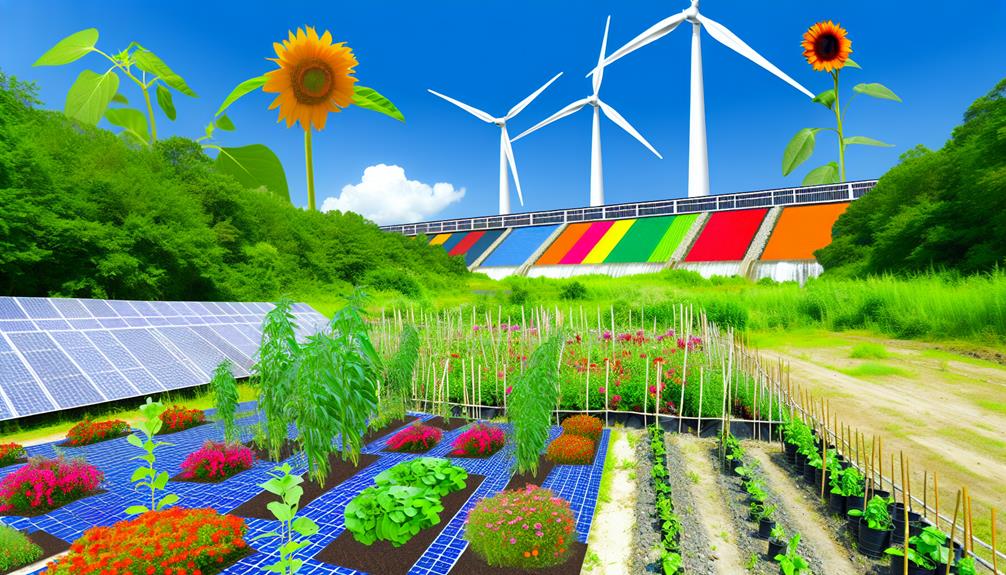
Switching to renewable energy sources is a smart move for communities looking to secure their energy future. By tapping into clean energy options, neighborhoods can cut down on pollution, reduce their carbon footprint, and build a more sustainable way of living.
Embracing renewables doesn't just help the environment; it also drives economic growth by creating new jobs and setting the stage for long-lasting prosperity.
Energy Independence Benefits
Switching over to renewable energy sources is like giving your community a superpower – it helps you become more self-sufficient and resilient in the long run. When you embrace solar and wind power, you're not just tapping into sustainable energy; you're taking control of your energy destiny.
Environmental Impact Reduction
Transitioning to renewable energy sources offers multiple benefits for communities. It boosts energy self-reliance and decreases environmental footprint, promoting long-term sustainability through clean practices. Renewable energy projects play a crucial role in improving energy efficiency and cutting down on greenhouse gas emissions. By shifting away from harmful fossil fuels, communities can embrace sustainable energy alternatives and combat climate change. Investing in renewable technologies not only lessens the impact of energy production on ecosystems but also fosters environmental stewardship. This transition results in a cleaner environment, reducing air pollution and conserving natural resources. Embracing renewables is essential for mitigating environmental damage and securing a sustainable future for upcoming generations.
Building Self-Sufficient Communities With Clean Energy
Switching to clean energy solutions gives communities the power to meet their energy needs independently. Technologies like solar and wind power provide reliable renewable energy sources, reducing reliance on external power grids. By producing their own clean energy, communities can boost their resilience, becoming less susceptible to power outages and disruptions, especially in emergencies. This self-reliance not only ensures a more stable energy supply but also helps cut down on carbon emissions, promoting environmental sustainability.
Creating self-sufficient communities with clean energy also drives local empowerment and economic growth. Communities investing in clean energy not only open up job opportunities in the renewable energy sector but also bolster their energy security. By utilizing solar panels, wind turbines, and other clean energy sources, communities can take control of their energy needs, save on costs in the long term, and contribute to a greener future for upcoming generations.
Overcoming Energy Challenges Through Renewables
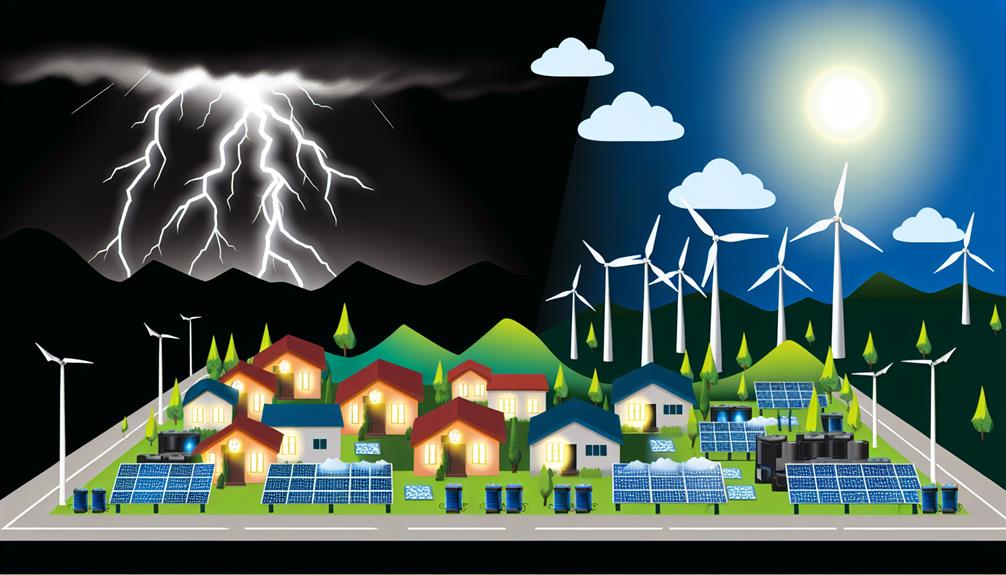
When communities switch to renewable energy solutions, they tackle energy challenges head-on by tapping into clean, reliable, and budget-friendly power sources. These initiatives are key in helping neighborhoods combat energy issues, offering access to sustainable electricity.
Embracing renewables reduces dependence on fossil fuels, cutting down on the risk of price swings and supply hiccups. By going decentralized with renewable energy systems like solar panels and wind turbines, communities boost their resilience. They can generate electricity locally, lessening the impact of centralized grid failures.
This self-sufficient approach not only helps during crises but also establishes a foundation for a greener, more stable energy setup in the long run. Opting for renewables not only deals with immediate energy hurdles but also paves the way for a robust, self-reliant community energy model.
Achieving Resilient Development With Renewable Energy
Getting involved in renewable energy projects is a game-changer for communities looking to build resilience. Imagine having clean, reliable, and affordable energy sources at your fingertips, especially during emergencies or blackouts. That's the power of integrating renewable energy technologies. Not only does it keep essential services running smoothly, but it also helps cut down on carbon emissions, fighting climate change head-on.
When communities own renewable energy projects, something magical happens. Local residents become the driving force behind their energy needs, creating a real sense of ownership and resilience. It's not just about energy security; it's also a boost for the local economy and social well-being. By investing in renewable energy, we lay down a solid foundation for a more resilient and sustainable future.
Frequently Asked Questions
How Does Renewable Energy Help the Community?
Renewable energy is a game-changer for your community, providing clean, reliable, and affordable electricity. It boosts energy resilience, cuts reliance on big power companies, bolsters grid stability in emergencies, empowers locals through grassroots projects, and champions the fight against climate change. It's like having a superhero on your side, making a real difference in your everyday life.
What Is Resilience in Renewable Energy?
When it comes to renewable energy, resilience is key. By creating systems that are flexible and have built-in backups, we can better handle disruptions. Take solar microgrids, for example. These setups provide reliable power, especially in emergencies, ensuring that communities stay powered up when the grid goes down. By investing in such initiatives, we not only boost energy independence but also work towards a more sustainable future for everyone.
Why Is Community Resilience Important?
Ensuring communities can withstand emergencies is key to keeping services running smoothly. When crises hit, vulnerable neighborhoods often bear the brunt of power outages, especially with the added strain of climate change. As energy costs soar, these challenges only worsen. That's where community-led initiatives step in, giving neighborhoods the tools to stay up and running even when the grid goes down. By empowering locals, we're making sure essential services don't skip a beat during blackouts.
How Can Renewable Energy Benefit the Farm and Community?
Renewable energy is a game-changer for farms and communities, cutting down on expenses and delivering clean, dependable power. Picture this: solar panels soaking up the sun's rays to produce electricity, reducing the need for traditional grid power. Then there are wind turbines, which harness the breeze to generate energy for local farms and neighborhoods. And let's not forget about biomass, which transforms waste into energy, paving the way for sustainability and self-reliance. It's like having a green powerhouse right in your backyard, making a real difference in cutting costs and promoting a greener future for all.
